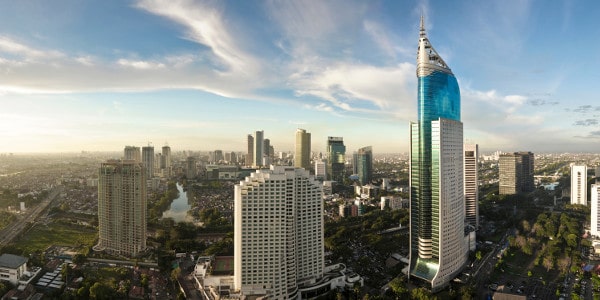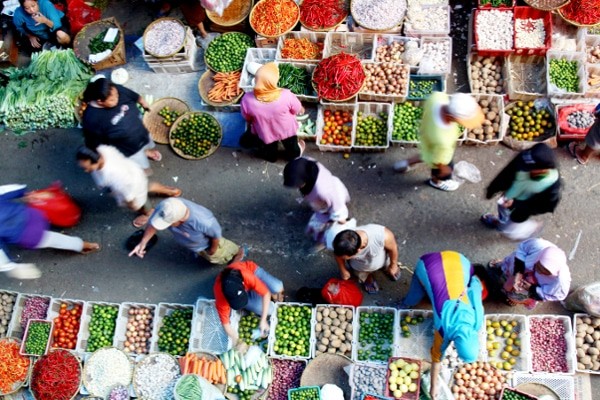

Indonesia has always been a sleeping giant in South East Asia. Social and political instability as well as its vast geography have historically disabled its efforts to take a firm footing on the world economic stage. In recent times consecutive Governments have finally managed to address many of the issues such as corruption and security that had previously deterred overseas investment and a strong physical footprint from Western companies.
As a result, Indonesia (like China before it) has undergone something of a commercial revolution, with the establishment of an affluent middle class to bridge the gap between the very poor and the very rich, which has traditionally formed Indonesia’s status quo. Walk around Indonesia’s capital Jakarta for example and you’re more likely to see massive shopping malls, opulent hotels and apartments along with boutiques selling luxury fashion brands. The street-hawkers and satay sellers are almost gone!
So, why has Indonesia seen such a swift boom establish itself? Indonesia has always benefited from vast natural resources. From the 17th-19th Centuries merchants from Portugal, Holland, Great Britain and the Arabian Peninsula came to trade across the Indonesian archipelago for the highly prized spices that were prevalent across the peninsula. Indeed, Indonesia became known as The Spice Islands during that time and was a major trading platform for the British and Dutch East Indies companies. Latterly, the main focus has been on Indonesia’s rich supplies

This success, along with the governments successful campaigns against corruption and improvements in security have heralded a return of many large global companies who had left in the 1990’s due to the social unrest during the Suharto government. This has brought confidence and prosperity and significant internal and external investment that has given rise to a greater amount of wealth spread across a larger number of people.
It’s still the major islands where the majority of people live and therefore these are the places where most investment and commercial activity takes place. So, as an ex pat moving to the Country, it’s most likely you’ll find yourself on Java island in the capital city of Jakarta. However, should you be moving to work with one of the many mining or oil exploration companies, you could just as easily find yourself on Sumatra or Kalimantan (Borneo).
Expect life in Indonesia to involve a significant culture change compared to Europe. While Indonesia is relatively Westernised certain local idiosyncrasies remain. Food and conversation are incredibly important to Indonesians and no subject is off the agenda, for example questions about your private and family life are perfectly normal from someone you have just met. Timekeeping is also fairly flexible. You’ll hear the phrase ‘jam karet’ or ‘rubber time’ to describe how arrangements can often be stretched! This is great if you’re late for a restaurant booking (it’s almost expected), but can be frustrating if you’re used to meetings starting on time. Respect for elders is also very important with each member of the family being organised in an age-based hierarchy.
Indonesia’s location and sprawling islands, means that influences on language, culture and food are very diverse. Slotting in between Malaysia and Singapore to the North and Australia to the South, Indonesia is an intoxicating mix of East and West.
In terms of language, Indonesian has influences from settlers and merchants from as far and wide as Portuguese, English, Arabic, Dutch, Chinese and Malay. It’s a fairly straightforward language without the grammatical complexities of a European based language. However, if you don’t fancy learning Indonesian, you’ll find that the majority of Indonesians speak good English and that most road signs, menus, signs in supermarkets along with other everyday things are in fact in English also.
The food in Indonesia is a similar melting pot of different styles and cultures. It’s best compared to a half-way house between Indian and Thai cuisine. As you’d expect from the world’s largest group of islands the sea has a big influence and fresh seafood is readily available across the Country. Pork tends not be eaten as the majority of Indonesia’s 300 million population are Muslim. Rice is arguably the most important ingredient in Indonesian cooking, often accompanied by thick stews or curries such as the delicious Beef Rendang, one of Indonesia’s most famous dishes. Satay is possibly Indonesia’s best known dish and although in Europe we expect it to be chicken and accompanied by peanut sauce, in Indonesia it could just as easily be beef or lamb and be served with a spicy dip. Fruit is also readily available in many shapes and forms, from regular fruits we eat in Europe through to more exotic types as dragon fruit, star fruit, rambutan, papaya and the infamously pungent durian! If you’re not the adventurous type, western food is readily available at both supermarkets and restaurants, particularly in ex pat districts such as Kemang and Pondok Indah in Jakarta. There are several Carrefour outlets across Indonesia as well as 3 Marks & Spencers stores!
Most Indonesians are mad about football and the English Premiership is very popular. If you’re British you will probably be interrogated at length about Premiership football and who you support. The big team unsurprisingly in Indonesia is Manchester United.
Indonesia is equatorial so has an all year round warm climate. The rainy season tends to arrive in December and carry on until March. However, temperatures tend to stay fairly constant at 28 degrees centigrade. Humidity is very high at some points of the year and can reach above 90%. Keeping the right level of hydration is very important and there are several local drinks that will help, particularly if you are in a major city where conditions can be sweltering.
Talking of the major cities, one thing that does tend to be fairly constant across Indonesia is the traffic. Indonesians take a similar approach to traffic signals as they do with timekeeping. Don’t be surprised to see cars driving merrily through red lights or trying to undertake you, even when you’re on the inside lane! There are also a myriad of moped riders who appear out of nowhere, so keep your eyes peeled! The only saving grace is that Indonesians drive on the left – a legacy of the British, who liberated the islands from the Japanese in latter part of WWII and helped to get the Country back on its feet.
Indonesia’s expanse of islands, measuring from the Western tip of Sumatra to the Eastern tip of Papua is the same distance from London to Tehran. The considerable distances as well as the congested roads means that often the most practical mode for domestic travel needs to be by air. It’s surprising then that there are very few reliable, good quality domestic carriers. This means that Singapore is often used as a travel hub since it’s only an hour’s flight from Jakarta. Indonesia has many beautiful holiday destinations from the beautiful (and well known) paradise islands of Bali and Lombok to the lesser known retreats of Moyo and the Gili Gili islands. All of these are blessed with beautiful beaches and friendly local inhabitants who provide a warm and hospitable welcome to travellers. If you want to go further afield though, there’s amazing paradise destinations in all directions, with Thailand, Malaysia and the Philippines only a few hours away and Sydney and Brisbane a 6 to 7 hours flight away.
Travel on land tends to be cheap, but unreliable and while it’s a tight squeeze on the roads, it can also be similar on trains and buses. Travelling by boat is very popular for Indonesians visiting family on outlying islands. However, by far the most popular travel method for Westerners is air.
The cost of living in Indonesia varies dramatically depending on where you are. Jakarta and Bali are expensive in comparison to other locations since these have the highest concentration of foreign ex pats and tourists. However, prices for most things are less than a comparable item in Europe. A meal for two in decent restaurant in Jakarta will cost you around £40 for example, with a gym membership roughly half that per month.
Indonesia’s currency is the Rupiah. The Rupiah can fluctuate fairly wildly, so expect exchange rates to be at around 20,000 to the UK Pound on a good day, but around 15,000 on a bad day. This can have a considerable effect on a week’s hotel prices in Bali so keep your eyes peeled!
If you’re moving to Indonesia with children, most major cities have British and American schools providing teachers of a very high standard. Indeed, most teachers at these schools tend to be ex pats themselves. Nannies and maids are easy to come by via well established companies that can provide references as well as acceptable salary rates. Do expect home help to be ‘live in’ though.
In terms of shipping your goods out to any part of Indonesia; talk to Britannia about your requirements and allow us to tailor something suitable to what you’re looking for. Britannia Movers operates with a number of different reputable and accredited companies across Indonesia and can therefore offer trusted advice and suggestions about your move. It all starts with a home survey, allowing our local representative to assess the goods you’re looking to move. Britannia can then suggest different methods of shipment to your chosen destination as well as giving advice on what paperwork needs completing and what items can be taken into Indonesia so you’re passage to your new life is kept as simple and uncomplicated as possible.
Indonesia is a wonderful Country containing a rich mixture of culture, colour and warmth. There are few more beautiful places on earth than its numerous paradise islands and with major cities like Jakarta becoming more dynamic by the day, you can still get your cosmopolitan fix of shopping and nightlife.
You can contact Britannia Movers by simply calling 0845 600 6661 or emailing our shipping office at international@britannia-movers.co.uk
Britannia Movers Easter Colouring Competition Here at Britannia, we're experts in transporting fragile items and…
Moving to a new country is an exciting adventure, but it can also come with…
Stamp Duty Land Tax is a tax that is paid by those who purchase property…
Relocating a business is an exciting opportunity to refresh your workspace and set your company…
Deciding to move abroad is an exciting but often overwhelming decision. Whether you're seeking new…
Whether you’re decluttering your home, moving into a new place or just need some extra…